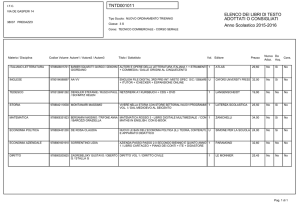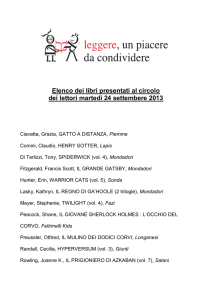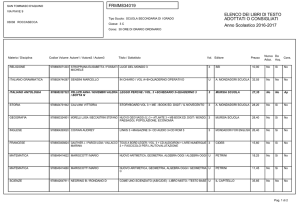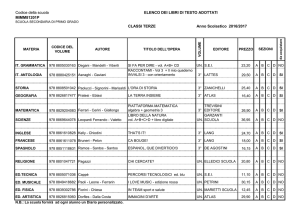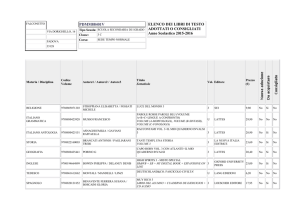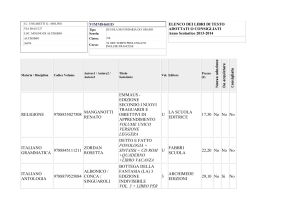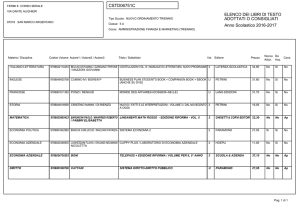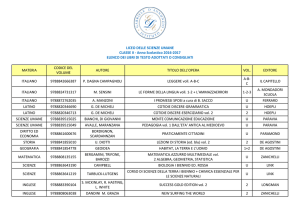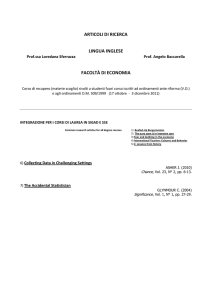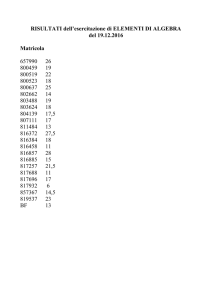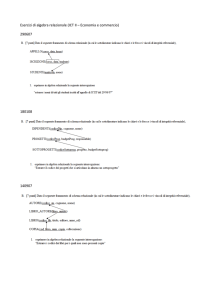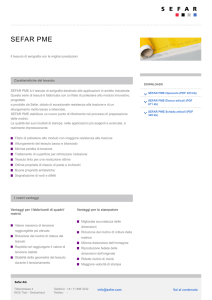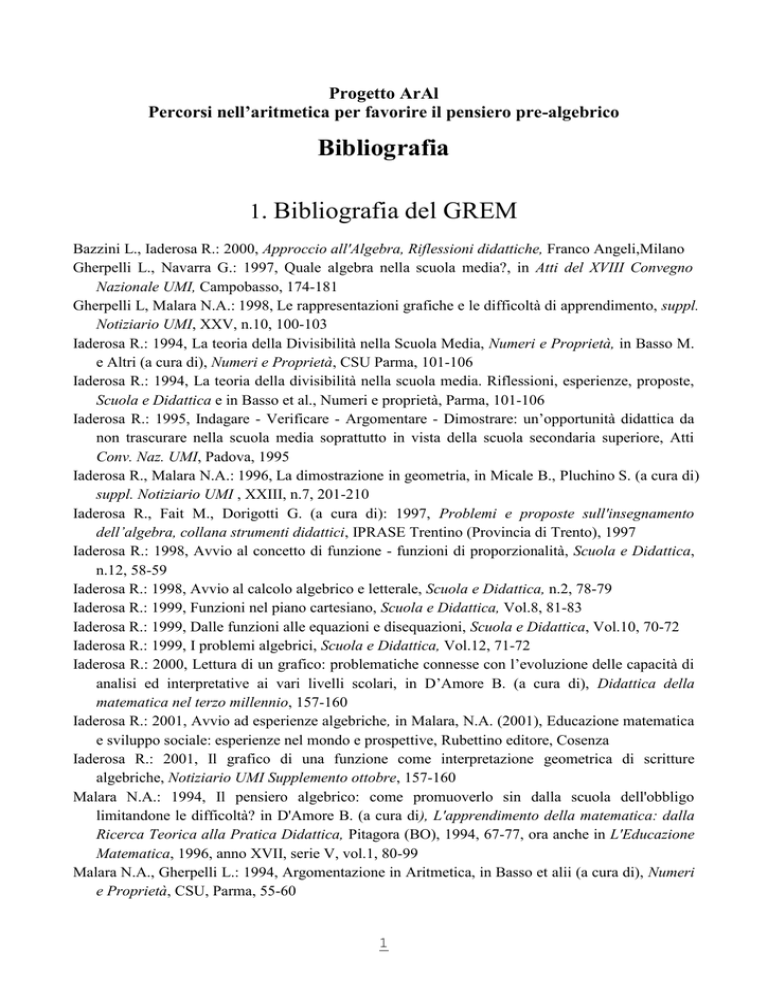
Progetto ArAl
Percorsi nell’aritmetica per favorire il pensiero pre-algebrico
Bibliografia
1. Bibliografia del GREM
Bazzini L., Iaderosa R.: 2000, Approccio all'Algebra, Riflessioni didattiche, Franco Angeli,Milano
Gherpelli L., Navarra G.: 1997, Quale algebra nella scuola media?, in Atti del XVIII Convegno
Nazionale UMI, Campobasso, 174-181
Gherpelli L, Malara N.A.: 1998, Le rappresentazioni grafiche e le difficoltà di apprendimento, suppl.
Notiziario UMI, XXV, n.10, 100-103
Iaderosa R.: 1994, La teoria della Divisibilità nella Scuola Media, Numeri e Proprietà, in Basso M.
e Altri (a cura di), Numeri e Proprietà, CSU Parma, 101-106
Iaderosa R.: 1994, La teoria della divisibilità nella scuola media. Riflessioni, esperienze, proposte,
Scuola e Didattica e in Basso et al., Numeri e proprietà, Parma, 101-106
Iaderosa R.: 1995, Indagare - Verificare - Argomentare - Dimostrare: un’opportunità didattica da
non trascurare nella scuola media soprattutto in vista della scuola secondaria superiore, Atti
Conv. Naz. UMI, Padova, 1995
Iaderosa R., Malara N.A.: 1996, La dimostrazione in geometria, in Micale B., Pluchino S. (a cura di)
suppl. Notiziario UMI , XXIII, n.7, 201-210
Iaderosa R., Fait M., Dorigotti G. (a cura di): 1997, Problemi e proposte sull'insegnamento
dell’algebra, collana strumenti didattici, IPRASE Trentino (Provincia di Trento), 1997
Iaderosa R.: 1998, Avvio al concetto di funzione - funzioni di proporzionalità, Scuola e Didattica,
n.12, 58-59
Iaderosa R.: 1998, Avvio al calcolo algebrico e letterale, Scuola e Didattica, n.2, 78-79
Iaderosa R.: 1999, Funzioni nel piano cartesiano, Scuola e Didattica, Vol.8, 81-83
Iaderosa R.: 1999, Dalle funzioni alle equazioni e disequazioni, Scuola e Didattica, Vol.10, 70-72
Iaderosa R.: 1999, I problemi algebrici, Scuola e Didattica, Vol.12, 71-72
Iaderosa R.: 2000, Lettura di un grafico: problematiche connesse con l’evoluzione delle capacità di
analisi ed interpretative ai vari livelli scolari, in D’Amore B. (a cura di), Didattica della
matematica nel terzo millennio, 157-160
Iaderosa R.: 2001, Avvio ad esperienze algebriche, in Malara, N.A. (2001), Educazione matematica
e sviluppo sociale: esperienze nel mondo e prospettive, Rubettino editore, Cosenza
Iaderosa R.: 2001, Il grafico di una funzione come interpretazione geometrica di scritture
algebriche, Notiziario UMI Supplemento ottobre, 157-160
Malara N.A.: 1994, Il pensiero algebrico: come promuoverlo sin dalla scuola dell'obbligo
limitandone le difficoltà? in D'Amore B. (a cura di), L'apprendimento della matematica: dalla
Ricerca Teorica alla Pratica Didattica, Pitagora (BO), 1994, 67-77, ora anche in L'Educazione
Matematica, 1996, anno XVII, serie V, vol.1, 80-99
Malara N.A., Gherpelli L.: 1994, Argomentazione in Aritmetica, in Basso et alii (a cura di), Numeri
e Proprietà, CSU, Parma, 55-60
1
Malara N.A.: 1997, Problemi di insegnamento-apprendimento nel passaggio dall’aritmetica
all’algebra, in Jannamorelli B. e Strizzi A. (a cura di) Atti del 3° Seminario Internazionale in
Didattica della Matematica, Sulmona, 9-22.
Malara N.A.: 1997, Mutamenti e permanenze nell'insegnamento delle equazioni algebriche da
un'analisi di libri di testo di Algebra editi a partire dal 1880, in BAZZINI L. (a cura di) La
Didattica dell'Algebra nella Scuola secondaria Superiore, ISDAF, Pavia, 145-154
Malara N.A.: 1997, Problemi nel passaggio Aritmetica-Algebra, La Matematica e la sua Didattica,
vol.2, 176-186
Malara N.A., Gherpelli L.: 1997, Argumentation and proof in Arithmetics: some results of a long
lasting research, proc First Mediterranean Conference on Mathematics Education , 139-148 in
versione italiana in L’Educazione Matematica, anno XVIII, serie V, vol.2, n.2, 82-102
Malara N.A Navarra G.: 1998, Role of the teacher in promoting interaction among pupils and
metacognition through problem solving abilities, proc. CIEAEM 49, 203-211
Malara N.A.: 1999, Theory and Practice: a case of fruitful relationship for the Renewal of the
Teaching and Learning of Algebra, in Jaquet F. (a cura di) Proc CIEAEM 50 - Relationship
between Classroom Practice and Research in Mathematics Education, 38-54 (con un breve
contributo di R. Iaderosa)
Malara N.A.: 1999, Un projecto de approximación al piensamento algebraico: experiencias,
resultadados, problemas, Revista EMA, vol.5, n.1, 3-28, in versione inglese più breve in
Rogerson A. (a cura di) proc. International Conference on Mathematics Education into 21st
Century: Societal Challenges, Issues and Approaches (Cairo, Egitto, nov. 1999), vol.2, 68-78,
in versione italiana ampia in stampa su Rivista di Matematica dell’Università di Parma (6), 3*,
153-181
Malara N.A.: 1999, An aspect of a long term research on algebra: the solution of verbal problems,
proc. PME 23, Haifa, Israele, vol.3, 257-264, in versione italiana su L’Educazione Matematica,
1999, anno XX, serie VI, vol.1, n.2, 96-110
Malara N.A.: 2000, Il problema didattico dell'approccio ai razionali nella loro struttura, in
D’Amore, B. (a cura di), Didattica della matematica nel terzo millennio, 93-103
Malara N.A.: 2000, La dimostrazione in ambito aritmetico, quale spazio nella scuola secondaria?, in
Malara N.A (a cura di): 2001, Educazione Matematica e Sviluppo Sociale: esperienze nel
mondo e prospettive, Rubettino editore, 129-166
Malara N.A., Tagliagambe R.: 2000, Evoluzione nell’insegnamento delle equazioni algebriche, in
Gallo E. et al. (a cura di), Seminari e Conferenze Mathesis subalpina 1999-2000, Torino, 23-39
Malara N.A., Brandoli M.T., Fiori C.: 2000, Comportamenti di studenti in ingresso all’università di
fronte allo studio di disequazioni, La Matematica e la sua Didattica, n.2, 208-226, presentato su
invito al WG ‘Algebra’ al PME 23 (Haifa, luglio 1999)
Malara N.A., Navarra G.: 2000, Explorative ways to encourage algebraic thinking through problems,
in Gagatsis, E, Makrides G. (eds) proc. II Mediterranean Conference on Mathematics Education,
vol 1, 55-64, anche versione italiana in L’Educazione Matematica, anno XXVI, serie VI, n.1,
vol.2, 7-21
Malara N.A: 2000, Innovative Paths for Approaching Rational Numbers from the Structural Point
of View, Rogerson A. (ed), proc. International Conference on ‘Mathematics for Living’,
Amman, novembre 2000, 202-208. in edizione italiana più breve in Navarra, G. et al. (a cura
2
di), 2001, Atti del 3° Internuclei Scuola dell’obbligo: Valutazione dei processi di
apprendimento con particolare riferimento alle difficoltà, Università di Napoli, Napoli, 38-46
Malara N.A., Iaderosa R.: 2000, The Interweaving of Arithmetic and Algebra: Some Questions
About Syntactic, Relational and Structural Aspects and their Teaching and Learning, in Swanke
E (ed) European Research in mathematics Education vol. 2, 159-171 in edizione più ampia in
Gomez P., Rico L. (a cura di), Iniciación a la investigación en la Didactica de la Matematica,
2001, Homenajes, Granada, 301-312
Malara N.A.: 2001, The behaviour of future teachers dealing with proof problems in arithmetic, in
Rogerson, A. (a cura di) proc. Congr. Int. New Ideas in Mathematics Education, (Palm Cove,
Queensland, Australia, 2001), 162-166
Malara N.A., Iaderosa R: 2001, Un aspetto di un percorso didattico per l’approccio al concetto di
funzione, L’Insegnamento della Matematica e delle Scienze Integrate, vol. 24A, n.4, 376-387,
in sintesi anche in proc. PME 25, (Utrecht, 2001), vol.1, 320, in versione inglese in Rogerson,
A. (a cura di) proc. Congr. Int. New Ideas in Mathematics Education, (Palm Cove, Queensland,
Australia, 2001), 156-165
Malara N.A., Navarra G.: 2001, ‘Brioshi’ e altri strumenti di mediazione per un insegnamento
relazionale dell’aritmetica nell’ottica di un avvio all’algebra come linguaggio, Atti del quarto
Convegno Nazionale Intenuclei Scuola dell’obbligo: Il problema dell'emergenza dell'oggetto
matematico. Aspetti epistemologici e questioni di osservazione e interpretazione dei processi di
apprendimento, Monticelli Terme, 2001, Pitagora, Bologna
Malara N.A., Navarra G.: 2001, Promoting an early approach to the algebraic thought, in primary
and middle school., proc. SEMT ’01 (Praga, 2001), 119-121
Malara N.A.: 2001, Aspetti relazionali dell’aritmetica e avvio al pensiero algebrico, in Bazzini L. (a
cura di) atti Conv. Naz. ‘Scuola a che punto siamo?’ (Milano, 2000), 21-31
Navarra G.: 1998, Percorsi nell’aritmetica per favorire il pensiero pre-algebrico, Atti: Incontri con
la matematica n.13: Diversi aspetti e diversi ambiti della didattica della matematica, Castel
S.Pietro, 127-128
Navarra G., Reggiani M., Tortora R. (a cura di): 2001, Atti 3° Internuclei Scuola dell’obbligo:
Valutazione dei processi di apprendimento con particolare riferimento alle difficoltà, Università
di Napoli, Napoli
Navarra G.: 2001, Percorsi esplorativi di avvio al pensiero algebrico attraverso problemi;
osservazione e rilevazione di difficoltà in insegnanti e allievi, Atti 3° Convegno Nazionale
Internuclei Scuola dell’obbligo: Valutazione dei processi di apprendimento con particolare
riferimento alle difficoltà, Vico Equense, 53-60
Navarra G.: 2001, Una questione di stuzzicadenti, riflessioni sul linguaggio naturale e sul
linguaggio algebrico, Italiano & oltre, 90-96
Navarra G., 2001, Progetto ArAl: percorsi nell’aritmetica per favorire il pensiero pre-algebrico, Atti
Incontri con la matematica n.15: Didattica della matematica e rinnovamento curricolare,
Castel S.Pietro, 2001, 173-176
Pubblicazioni in corso di stampa
Malara N.A.: 2001, From fractions to rational numbers in their structure: outlines of an innovative
didactical strategy and the question of density, in stampa su atti del Congresso internazionale
3
CERME 2, Marienbad, Repubblica Ceka (febbraio 2001)
Iaderosa R., Malara N.A.: 2001, Il numero naturale e le sue proprietà: loro varianza e invarianza
rispetto alla rappresentazione, in Malara, N.A. et al. Atti del IV Conv. Naz. Internuclei
‘L’emergere dell’oggetto matematico’ (Monticelli Terme, 2001), Pitagora, Bologna
Malara N.A., Gherpelli L.: 2001, Un approccio ai razionali centrato sugli aspetti di rappresentazione
e sul ragionamento per analogia, in Malara, N.A. et al. (a cura di) Atti del IV Conv. Naz.
Internuclei ‘L’emergere dell’oggetto matematico’, (Monticelli Terme, 2001) Pitagora, Bologna
Navarra G.: 2001, Progetto speciale ArAl: percorsi nell’aritmetica per favorire il pensiero prealgebrico, Atti del Convegno Internazionale Educazione matematica e sviluppo sociale, Reggio
Calabria, in stampa
Reggiani M., Grugnetti L., Iaderosa R. (a cura di): 1996, Argomentare e Dimostrare nella scuola
media, Centro stampa Università di Pavia, Pavia
2. Bibliografia Generale
Arzarello F., Bazzini L., Chiappini G.: 1994, L’algebra come strumento di pensiero, Analisi teorica
e considerazioni didattiche, Progetto strategico del CNR, Quaderno n.6
Aczel J.: 2001, Towards a theoretical synthesis of research in the early learning of symbolic
algebra, Proc. 12th ICMI Study ‘The future of the teaching and learning of Algebra’, Univ.
Melbourne, Australia, vol.1: 13-20
Arcavi A.: 1994, Symbol sense: informal sense-making in formal mathematics, For the Learning of
Mathematics, vol.14, n.3, 24-35
Bazzini L., Iaderosa R.: 2000, Insegnamento-apprendimento dell’algebra, Franco Angeli, Milano
Bell A.W., Malone J.A., Taylor P.C.: 1987, Algebra-An Exploratory Teaching Experiment, Shell
Centre Nottingham, UK
Bell A.: 1995, Purpose of School Algebra, Journal of Mathematical Behaviour, vol.14, 42-73
Bernardz N.: 2001, A problem-solving approach to algebra: accounting for the reasoning and
notations developed by students, Proc. 12th ICMI Study ‘The future of the teaching and learning
of Algebra’, Univ. Melbourne, Australia, vol.1, 69-78
Bernardz N., Janvier L.: 1996, Emergence and Development of Algebra as a Problem Solving Tool:
tool: Continuities and Discontinuities with Arithmetic, in Bernardz & Al. (a cura di)
Approaches to Algebra, perspectives for research and teaching, Kluver Academic Press
Boero P.: 1992, Sulla specificità delle ricerche in Didattica della Matematica: il caso del formalismo
algebrico, L’insegnamento della Matematica e delle Scienze Integrate, vol.15, n.10, 963-986
Brizuela B., Lara-Roth S.: 2001, Additive relations and function tables, Proc. 12th ICMI Study, ‘The
future of the teaching and learning of Algebra’, Univ. Melbourne, Australia, vol.1: 110-119
Carpenter T., Franke M.L.: 2001, Developing algebraic Reasoning in the elementary school:
generalization and proof, Proc. 12th ICMI Study ‘The future of the teaching and learning of
Algebra’, Univ. Melbourne, Australia, vol.1: 155-162
Carraher D., Brizuela B., Earnest D.: 2001, The reification of additive difference in early algebra:
viva la difference, Proc. 12th ICMI Study, ‘The future of the teaching and learning of Algebra’,
Univ. Melbourne, Australia, vol. 1: 163-170
4
Chevallard Y.: 1989-1990, Le passage de l'arithmétique a l'algèbre dans l'enseignement des
mathématiques au collège, parts2 and 3, Petit X, n.19, 43-72 e n. 23, 5-38
Cornoldi C.: 1995, Metacognizione e apprendimento, Il Mulino, Bologna
Davis, R.B.: 1985, ICME 5 Report, Algebraic Thinking in the early grades, Journal of
Mathematical Behaviour, 4: 195-208
Demby A.: 1997, Algebraic procedures used by 13 to 15 year old, Educational Studies in
Mathematics, vol.33, 45-70
Doblaev L.P.: 1969, Thought processes in setting up equations, in Kilpatrick J. Wirszup I. (eds)
Soviet Studies in the Psychology of Learning and Teaching Mathematics, vol. III, National
Council of Teachers of Mathematics, University of Chicago press, Chicago: 103-183
Filloy E., Rojano T.: 1989, Solving Equations: The transition from arithmetic to algebra, For the
Learning of Mathematics, 9 (2): 19-25
Freudenthal H.: 1974, Soviet Research on Teaching Algebra, Educational Studies in Mathematics
n.5, 391-412
Goodson-Epsy T.: 1998, The roles of reification and reflective abstraction in the development of
abstract thought: transition from arithmetic to algebra, Educational Studies in Mathematics,
vol.36, n.3, 219-245
Harper E.: 1987, Ghost of Diophantus, Educational Studies in Mathematics, vol.18, 75-90
Hatch G.: 2001, Making Algebra meaningful to Pupils, Proc. 12th ICMI Study ‘The future of the
teaching and learning of Algebra’, Univ. Melbourne, Australia, vol.1, 288-295
Herscovics N.: 1989, Cognitive Obstacles Encountered in the Learning of Algebra, in Wagner S.,
Kieran K. (a cura di), Research Issues in the Learning and Teaching of Algebra, LEA, Reston
Virginia, 60-86
Herscovics N., Linchevski L.:1994, A Cognitive Gap between Arithmetic and Algebra, Educational
Studies in Mathematics, vol.27, 59-78
Hewitt D.: 1998, Approaching arithmetic algebrically, Mathematics Teaching: 163: 19-29
Kaput J., Blanton M.: 2001, Algebrafying the Elementary Mathematics Experience: Part 1:
Transforming Task Structures, part II Transforming practice on a district-wide scale, Proc. 12th
ICMI Study ‘The future of the teaching and learning of Algebra’, Univ. Melbourne, Australia,
vol.1, 344-353, 87-95
Kieran K.: 1989, The Early Learning of Algebra: a Structural Perspective, in Wagner S. and Kieran
K. (eds), Research Issues in the Learning and Teaching of Algebra, LEA, Reston Virginia, 3356
Kieran K.: 1990, Cognitive Processes involved in Learning School Algebra, in Nesher P., Kilpatrik
J. (eds), Mathematics and Cognition, ICMI Study Series, Cambridge University Press, 96-112
Kieran K.: 1992, The Learning and Teaching of School Algebra, in Grouws D.A. (a cura di),
Handbook of Research on Mathematics Teaching and Learning, Macmillan, NY, 390-419
Krigowska A.Z.: 1957, Sul pericolo del formalismo e del verbalismo nell'insegnamento dell'Algebra,
Archimede: 165-177
Kuchemann D.E.: 1981, Algebra, in Hart K. (ed) Children Understanding Mathematics, Murray,
London: 11-16
Lee L.: 2001, Early algebra - but which algebra?, Proc. 12th ICMI Study ‘The future of the teaching
and learning of Algebra’, Univ. Melbourne, Australia, vol.1, 392-399
Lemoyne G., Conne F., Brun J.: 1993, Du traitement des formes à celui des contenus d'écritures
5
litterales: une perspective d'enseignement introductif de l’Algèbre, Recherches en Didactique
des Mathématiques, vol.13, n.3, 333-384
Linchevski L.: 1995, Algebra with numbers and arithmetic with letters: a definition of pre-algebra,
Journal of Mathematical Behaviour, vol.14: 113 – 120
Linchevski L., Livneh D.: 1999, Structure Sense: the relationship between Algebraic and numerical
contexts, Educational Studies in Mathematics, vol.40, n.2: 173-196
Mac Gregor M.: 1991, Making Sense of Algebra, Cognitive Processes Influencing Comprehension,
Deakin University press, Geelong, Victoria, Australia
Mac Gregor M., Stacey K.: 1993, Cognitive Models underlying students' formulation of simple
linear equations, Journal for Research in Mathematics Education, vol.24, n.3, 217-232
Mac Gregor M., Stacey K.: 1997, Students’ understanding of Algebraic notations, Educational
Studies in Mathematics, vol.33, N.1: 1-19
Mac Gregor M., Price, E.: 1999, An exploration of aspects of language proficiency and algebra
learning, Journal for Research in Mathematics Education, v.30 (4), 449 - 467
MacGowen M.A., Davis G.E.: 2001, Changing pre-service elementary-teachers’ attitudes to
algebra, Proc. 12th ICMI Study ‘The future of the teaching and learning of Algebra’, Univ.
Melbourne, Australia, vol.2, 438-445
Nathan M.J., Koedinger, K.R.: 2000, Teachers’ and researchers beliefs about the development of
algebraic reasoning, Journal for Research in Mathematics Education, vol.31, n.2: 168-190
Phillip R.A.: 1992, A Study of Algebraic Variables: beyond the Student-Professor Problem, Journal
of Mathematical Behaviour, vol.11: 161-176
Pirie S., Martin L.: 1997, The equation, the whole equation and nothing but equation! One approach
to the teaching of linear equations, Educational Studies in Mathematics, vol.34: 159-181
Reggiani M.: 1997, Continuità nella costruzione del pensiero algebrico, Notiziario UMI, suppl.n.7,
35-62
Radford L.: 2000, Signs and Meanings in Students’ Emergent Algebraic Thinking: a Semiotic
Analysis, Educational Studies in Mathematics, vol.42, n.3, 237-268
Raymond A.M., Leinenbach M.: 2000, Collaborative action research on the learning and teaching
algebra: a story of one mathematics teacher development, Educational Studies in Mathematics,
vol.41, 283-307
Sáenz-Ludlow A., Walgamut C.: 1998, Third grades’ interpretations of equality and the equal
simbol, vol.35, n.2: 153-187
Sfard A.: 1991, On the Dual Nature of Mathematical Conceptions: Reflections on Processes and
Objects as Different Sides of the Same Coin, Educational Studies in Mathematics, vol.22: 1-36
Sfard A.: 1994, The Gains and Pitfalls of reification: The case of Algebra, Educational Studies in
Mathematics, vol.26: 191-228
Slavit D.: 1998/99, The role of operation sense in transition from arithmetic to algebraic thought,
Educational Studies in Mathematics, vol. 37, n.3, 251-274
Speisier B., Walter C.: 1997, Performing Algebra: emergent discourse in a fifth-grade classroom,
Journal of Mathematical Behaviour: 16 (1), 39-49
Stacey K., Mac Gregor M.: 1999, Learning the algebraic method of solving problems, Journal of
Mathematical Behaviour: 18 (2): 149-167
Swafford J.J., Langrall C.W.: 2000, Grade 6 students’ preinstructional use of equations to describe
and represent problem situation, Journal for Research in Mathematics Education, n.1, 89-112
6
Sutherland R.: 1997, Teaching and learning Algebra pre-19, London, RS/JMC
Tirosh D., Even R., Robinson N.: 1998, Simplifying Algebraic Expressions: Teacher awareness and
teaching approaches, Educational Studies in Mathematics, vol. 35, 51-64
Van Reeuwijk M.: 2001, From informal to formal, progressive formalization an example on
Solving System of Equations, Proc. 12th ICMI Study ‘The future of the teaching and learning of
Algebra’, Univ. Melbourne, Australia, vol. 2, 613-620
Vinner S.: 1997, The pseudo-conceptual and the pseudo-analytical thought processes in
mathematics learning, Educational Studies in Mathematics, vol.34, n.2, 97-129
Warren E.: 2001, Algebraic Understanding: the importance of learning in the early years, Proc. 12th
ICMI Study ‘The future of the teaching and learning of Algebra’, Univ. Melbourne, Australia,
vol.2, 633-640
3. Bibliografia del PME
Il gruppo internazionale per la psicologia dell’educazione matematica (PME) nasce nel 1976 al
congresso ICME di Karlshue per opera di Efraim Fischbein. L’obiettivo è quello di promuovere lo
studio e il confronto sui problemi di tipo psicologico connessi con l’insegnamento e
l’apprendimento della matematica, in connessione con questioni storico-epistemologiche - legate
all’evoluzione della disciplina -, metodologiche - legate alle tradizioni di insegnamento ed ai sistemi
di formazione degli insegnanti nei vari paesi – e con questioni più ampie - di tipo antropologico,
sociologico e etnologico -.
Il gruppo organizza ogni anno un convegno; i contributi offerti dai vari ricercatori sono sottoposti
ad un preventivo triplice referaggio che, per la variegata composizione culturale del gruppo stesso,
risulta fortemente selettivo.
Attualmente gli Atti del PME (in 4 volumi) raccolgono in media 500 contributi da tutto il mondo
e sono quanto di più ricco e avanzato nella ricerca in didattica della matematica.
1987
Boileau A., Kieran C., Garançon M.: 1987, La pensée algorithmique dans l'initiation à l'algèbre,
proc. PME XI, vol.1: 183-189
Booker G.: 1987, Conceptual obstacles to the development of algebraic thinking, proc. PME XI,
vol.1, 275-281
Booth L.R.: 1987, Equations revisited, proc. PME XI, vol.1, 282-288
Carraher T.N., Schielmann A.D.: 1987, Manipulating equivalences in the market and in maths,
proc. PME XI, vol.1, 289-294
Dreyfuss T., Eisemberg T.: 1987, On the deep structure of functions, proc. PME XI, vol.1: 190-197
Filloy E.Y.: 1987, Modelling and the teaching of Algebra, proc. PME XI, vol.1, 289-294
Gallardo A., Rojano T.: 1987, Common difficulties in the learning of algebra among children,
displaying low and medium pre-algebraic proficiency levels, proc. PME XI, vol.1, 301-307
7
Goldenberg E.P.: 1987, Believing is seeing: how preconceptions influence the perception of graphs,
proc. PME XI, vol.1: 197-203
Kirshner D.: 1987, The myth about binary representation in algebra, proc. PME XI, vol.1, 308-316
Lee L.: 1987, The status and understanding of generalised algebraic statements by high school
students, proc. PME XI, vol.1, 316-323
Lesh R., Herre J.: 1987, Dienes revisited: multiple embodiments in computer environments, proc.
PME XI, vol.1, 211-219
Nelson G.T.: 1987, Using microcomputer-assisted problem solving to explore the concept of literal
symbols - a follow-up study, proc. PME XI, vol.1, 221-227
Nonnon P.: 1987, Acquisition d'un langage graphique de codage par la modélisation en temps réel
des données d'expériences, proc. PME XI, vol.1, 228-234
Norman F.A.: 1987, A psycholinguistic perspective of algebraic language, proc. PME XI, vol.1,
234-330
Pereira-Mendoza L.: 1987, Error patterns and strategies in algebraic simplification, proc. PME XI,
vol.1, 331-337
Putnam R.T., Lesgold S.B., Resnik L.B., Sterret S.G.: 1987, Understanding sign change
transformations, proc. PME XI, vol.1, 338-344
Schwartz J.L.: 1987, The representation of function in the Algebraic Propose, proc. PME XI, vol.1,
234-240
Sutherland R.: 1987, A study of the use and understanding of algebra related concepts within a logo
environment, proc. PME XI, vol.1, 241-247
Thompson P.W., Thompson A.G.: 1987, Computer presentations of structure in algebra, proc. PME
XI, vol.1, 248-254
Zehavi N., Gonen R., Omer S., Taizi N.: 1987, The effects of microcomputer software on intuitive
understanding of graphs of quantitative relationships, proc. PME XI, 255-261
1988
Becker G.: 1988, A classification of students' errors in secondary level algebra, proc. PME XII,
vol.1: 131-138
Bell A.: 1988, An Exploratory Teaching Experiment, proc. PME XII, vol.1: 147-153
Bliss J., Sakonidis H.: 1988, Teachers’ written explanations to pupils about algebra, proc. PME XII,
vol.1: 139-146
Even R.: 1988, Pre-service teachers conceptions of the relationships between functions and
equations, proc. PME XII, vol.1, 304-311
Fuji T.: 1988, The meaning of ‘x’ in linear equation and inequality: preliminary survey using
cognitive conflict problems, proc. PME XII, vol.1, 334-341
Kieran C.: 1988, Learning the structure of algebraic expressions and equations, proc. PME XII,
vol.1, 343-440
Oliver A.: 1988, The construction of an algebraic concept through conflict, proc. PME XII, vol.1,
511-518
Schwartz B., Bruckheimer M.: 1988, Representations of functions and analogies, proc. PME XII,
vol.2, 552-559
8
Sfard A.: 1988, Operational vs. Structural method of teaching mathematics- case study, proc. PME
XII, vol.2, 560-567
Sierpinska A.: 1988, Epistemological remarks on functions, proc. PME XII, vol.2, 568-573
Thomas M., Tall D.: 1988, Longer-Term conceptual benefits from using a computer in algebra
teaching, proc. PME XII, vol.2, 601-608
Zehavi N.: 1988, Substitutions leading to reasoning, proc. PME XII, 665-672
1989
Booth L.R.: 1989, Grade 8 students' understanding of structural properties in mathematics, proc.
PME XIII , vol.1, 141-148
Frielander A.,Hershowitz R., Arcavi A.: 1989, Incipient ‘algebraic’ thinking in pre-algebra students,
proc. PME XIII, vol.1, 283-290
Hoz R., Harel G.: 1989, The facilitating role of table forms in solving algebra speed problems: real
or imaginary?, proc. PME XIII, vol.2: 123-130
Kieran C.: 1989, A perspective on algebraic thinking, proc. PME XIII, vol.2, 163-171
Sfard A.: 1989, Transition from operational to structural conception: the notion of function
revisited, proc. PME XIII, vol.3, 151-158
Sutherland R.: 1989, Developing algebraic understanding: the potential of a computer based
environment, proc. PME XIII, vol.2, 205-212
Yerushalmy M.: 1989, The use of graphs as visual interactive feedback while carrying out algebraic
transformations, proc. PME XIII, vol.2, 252-260
Zehavi N., Schwartz B.: 1989, A knowledge-base of student reasoning about characteristics of
functions, proc. PME XIII, vol.3, 269-276
1990
Avila A., Garcia F., Rojano T.: 1990, Algebraic syntax errors: a study with secondary school
children, PME XIV, vol.2., 11-18
Cifarelli V.: 1990, The development of conceptual structure as a problem solving activity, PME
XIV, vol.2, 19-26
Cortes S.A., Vergnaud G., Kavafian N.: 1990, From arithmetic to algebra: negotiating a jump in the
learning process, PME XIV, vol.2, 27-34
Filloy E.: 1990, PME algebra research. A working perspective, PME XIV, vol.1, 1-33
Gallardo A., Rojano T.: 1990, Avoidance and acknowledgment of negative numbers in the context
of linear equations, PME XIV, vol.2, 43-49
Garancon M., Kieran C., Boileau A.: 1990, Introducing algebra: a functional approach in a
computer environment, PME XIV, vol.2, 51-58
Guin D., Guzman-Retamal I.: 1990, LOGO to teach the concept of function, PME XIV, vol.2, 59-66
Hitt F.: 1990, The concept of function: continuity image versus discontinuity image (Computer
experience), PME XIV, vol.2, 67-74
Linchevski L., Vinner S.: 1990, Embedded figures and structures of algebraic expressions, PME
XIV, vol.2, 85-92
9
Lins R.C.: 1990, A framework for understanding what Algebraic Thinking is, PME XIV, vol.2, 93100
Meira L.L.: 1990, Developing knowledge of functions through manipulation of a physical device,
PME XIV, vol.2, 101-108
Moschkovich J.: 1990, Students' interpretations of linear equations and their graphs, PME XIV,
vol.2, 103-116.
Rubio G.: 1990, Algebra word problems: a numerical approach for its resolution (a teaching
experiment in the classroom), PME XIV, vol.1 I, 125-132
Sakonidis H., Bliss J.: 1990, Children’s writing about the idea of variable in the context of a
formula, PME XIV, vol.2, 133-140
Seeger F.: 1990, Observations on the ‘reversal error’ in algebra tasks, PME XIV, vol.2, 141-14
Ursini S.: 1990, Generalization processes in elementary algebra: interpretation and symbolization,
PME XIV, vol.2, 149-156
1991
Arzarello F.: 1991, Procedural and relational aspects of algebraic thinking, PME XV, vol.1, 80-87
Bakar M., Tall D.: 1991, Students’ mental prototypes for functions and graphs, PME XV, vol.1,
104-111
Chiappini G., Lemut E.: 1991, Construction and interpretation of algebraic models, PME XV, vol.1,
199-206
Filloy E.: 1991, Cognitive tendencies and abstraction processes in algebra learning, PME XV, vol.2,
48-55
Hershovics N., Linchhevski L.: 1991, Pre-algebraic thinking range of equations and informal
solution processes used by seventh graders prior to any instruction, PME XV, vol.2, 173-180
Kieran C.: 1991, A procedural-structural perspective on algebra research, PME XV, vol.2, 245-253
Linchevski L., Sfard A.: 1991, Rules without reasons as processes without objects: the case of
equations and inequalities, PME XV, vol.2, 317-324
Margolinas C.: 1991, Interrelations between different levels of didactic analysis about elementary
algebra, PME XV, vol.2, 381-388
Rojano T., Sutherland R.: 1991, Symbolising and solving algebra word problems: the potential of a
Spreadsheet environment, PME XV, vol.3, 207-213
Tirosh D., Hadass R., Movshovic-Hadar N.: 1991, Overcoming overgeneralizations: the case of
commutativity and associativity, PME XV, vol.3, 310-315
Ursini S.: 1991, First steps in generalization processes in algebra, PME XV, vol.3, 316-323
Wolters M.A.: 1991, The equal sign goes both ways: how mathematics instruction leads to the
development of a common misconception, PME XV, vol.3, 348-355
Yerushalmy M., Gafni R.: 1991, The effect of graphic representation: an experiment involving
algebraic trasformation, PME XV, vol.3, 372-377
1992
Bernarz N., Radford L., Janvier B., Lepage A.: 1992, Arithmetical and algebraic thinking in
problem-solving, PME XVI, vol.1, 65-72
10
Hershovics N., Linchhevski L.: 1992, ‘Cancellation within-the-equation’ as a solution procedure,
PME XVI, vol.1, 265-272
Lins R.C.: 1992, Algebraic and Non-algebraic algebra, PME XVI, vol.2, 56-63
Nathan M.J.: 1992, Interactive depiction of mathematical constrains can increase students’ levels of
competence for word algebra problem solving, PME XVI, vol.2. 160-169
Robinson N., Even R., Tirosh D.: 1992, Connectedness in teaching algebra: a novice-expert
contrast, PME XVI, vol.2, 258-265
1993
Arzarello F., Bazzini L., Chiappini G.: 1993 Cognitive processes in algebraic thinking: towards a
theoretical framework, proc. PME XVII, vol.1, 138-145
Cortes A.: 1993 Analysis of errors and a cognitive model in the solving of equations, proc. PME
XVII, vol.1, 146-153
Filloy E., Rubio G.: 1993 Didactic models, cognition and competence in the solution of arithmetic
and algebra problem solving, proc. PME XVII, vol.1, 154-162
Fishbein E., Barach A.: 1993, Algorithmic models and their misuse in solving algebraic problems,
proc. PME XVII, vol.1, 162-172
Fuji T.: 1993, A clinical interview on children's understanding and misconceptions of literal symbol
in school mathematics, proc. PME XVII, vol.1, 173-180
Mac Gregor M., Stacey K.: 1993, Seeing a pattern and writing a rules, proc. PME XVII, vol.1, 181188
Rojano T., Sutherland R.: 1993, Towards an algebraic approach: the role of spreadsheets, proc.
PME XVII, vol.1, 189-196
Garancon M., Kieran C., Boilau A.: 1993, Using a discrete computer graphing in algebra problem
solving: notion of infinity/continuity, proc. PME XVII, vol.2, 25-32
Dagher A., Artigue M.: 1993, The use of computers in learning to correlate algebraic and graphing
representation of functions, proc. PME XVII, vol.2, 81-88
1994
Kieran C.: 1994, A functional approach to the introduction of algebra, some pros and cons, proc.
PME XVIII, vol.1, 124-132
Arzarello F., Bazzini L., Chiappini G.: 1994, The process of naming in algebraic problem solving,
proc. PME XVIII, vol.2, 40-47
Bernardz D., Doufur-Janvier B.: 1994, The emergence and development of algebra in problem
solving context: a problem analysis, proc. PME XVIII, vol.2, 64-71
Bills J.E.,1994, One's company, two a crowd-pupils' difficulties with more than one variable, proc.
PME XVIII, vol.2, 80-87
Bloedy-Vinner H.: 1994, The analgebraic mode of thinking: the case of parameter, proc. PME
XVIII, vol.2, 88-95
Croewly L., Thomas M., Tall D.: 1994, Algebra, symbol and translation of meaning, proc. PME
XVIII, vol.2, 240-247
11
Ferrari P.L.: 1995, On some factors affecting advanced algebraic problem solving, proc. PME
XVIII, vol.2, 345-352
Furinghetti F., Paola D.: 1994, Parameters, unknowns and variables: a little difference?, proc. PME
XVIII, vol.2, 368-375
Linchewsky L., Herschovits S.N.: 1994, Cognitive obstacles in pre-algebra, proc. PME XVIII, vol.3,
176-183
Mac Gregor M., Stacey K.: 1994, Metalinguistic awareness and algebra learning, proc. PME XVIII,
vol.3, 200-207
Pence B.: 1994, Teachers perception of algebra, proc. PME XVIII, vol.4, 17-23
Reggiani M.: 1994, Generalization as a basis for algebraic thinking: observations with 11-12 year
old pupil, proc. PME XVIII, vol.4, 97-104
Robinson N., Even R., Tirosh P.: 1994, How teachers deal their students conception of algebraic
expression as incomplete, proc. PME XVIII, vol.4, 129-135
Sfard A., Linchevsky L.: 1994, The interpreter and the doer, proc. PME XVIII, vol.4, 257-264
Mac Gregor M., Stacey K.: 1994, Algebraic sums and products: students' concepts and symbolisms,
proc. PME XVIII, vol.4, 289-295
1995
Ainley J.: 1995, Reasons to be formal: contestualizing formal notation in a spreadsheet
environment, proc. PME XIX, vol.2, 26-33
Bernardz N., Radford L., Janvier B.: 1955, Algebra as a problem solving tool: one unknowns or
several unknows, proc. PME XIX, vol.3, 160-167
Bloedy-Vinner H.: 1995, Analgebraic interpretations of algebraic expression. Functions or
predicates?, proc. PME XIX, vol.2, 42-49
Coady C.: 1995, Students’ responses utilising the procedural and structural aspects of algebra, proc.
PME XIX, vol.2, 50-57
Cortes A.: 1995, World problems: operational invariants in the putting into equation process, proc.
PME XIX, vol.2, 58-65
Rocha Falcao J.T.: 1995, A case of algebraic scaffolding: from balance scale to algebraic notation,
proc. PME XIX, vol.2, 66-73
Perrin Glorian J. M.: 1995, The absolute value in secondary school. A case study of
‘institutionalisation process’, proc. PME XIX, Vol.2, 74-81
Sakonidis H., Bliss J.: 1995, Mathematical discourse: insights into children’s use of language in
algebra, proc. PME XIX, vol.3, 97-104
Schmidt S., Bernardz N.: 1995, The gap between arithmetical an algebraic types of reasoning in
problem-solving among the pre-service teachers, proc. PME XIX, vol.2, 82-89
Stacey K., Mac Gregor M.: 1995, The influence of problem representation on algebraic writing and
solution strategies, proc. PME XIX, vol.2, 90-97
Warren E.: 1995, The development of elementary algebraic understanding, proc. PME XIX, vol.2,
98-105
Yerushalmy M., Bohr M.: 1995, Between equation and solutions: an odyssey in 3D, proc. PME
XIX, vol.2, 218-225
12
1996
Bills L.: 1996, The use of examples in the teaching of mathematics, proc. PME XX, vol.2, 81-88
Bloedy-Vinner H.: 1996, The analgebraic mode of thinking and other errors in word problem
solving, proc. PME XX, vol.2, 105-112
Coady C., Pegg J.: 1996, Levels of forming reasoning in school algebra, proc. PME XX, vol.2, 233240
Gallardo A.: 1996, Qualitative analysis in the study of negative numbers, proc. PME XX, vol.2,
377-383
Healy L., Hayles C.: 1996, Seeing, doing, and expressing: an evaluation of task sequences for
supporting algebraic thinking, proc. PME XX, vol.3, 67-74
Hewitt D.: 1996, The use of levels of subordination to help students gain fluency in mathematics,
proc. PME XX, vol.3, 81-88
Kutsher B.: 1996, Application of reification theory in translating verbal expression and statements
into algebraic expression, proc. PME XX, vol.3, 201-208
Linchewsky L., Livneh D.: 1996, The competition between numbers and structure, proc. PME XX,
vol.3, 257-264
Linchewsky L., Williams J.: 1996, Situated intuitions, concrete manipulations and the construction
of mathematical concepts: the case of integers, proc. PME XX, vol.3, 265-272
Lopez-Real F.: 1996, Secondary pupil’s translations of algebraic relationship into everyday
language: a Hong Kong study, proc. PME XX, vol.3, 273-280
Mac Gregor M., Stacey K.: 1996, Learning to formulate equations for problem, proc. PME XX,
vol.3, 297-304
Radford L., Grenier M.: 1996, On dialectical relationship between signs and algebraic ideas, proc.
PME XX, vol.4, 179-186
Rocha Falcao J.T.: 1996, Clinical analysis of difficulties in algebraic problem solving among
Brazilian students: principal aspects and didactic issues, proc. PME XX, vol.2, 257-263
Rojano T., Sutherland R., Ursini S., Molyneux S., Jinich E.: 1996, Ways of solving algebra
problems: the influence of school culture, proc. PME XX, vol.4, 219-226
1997
Bill L.: 1997, Stereotypes of letteral symbol use in senior school algebra, proc PME XXI, vol.2, 7380
Cooper T.J. Boulton-Lewis G.M., Atweh B., Pillay H, Wills L. & Mutch S.: 1997, The transition
from arithmetic to algebra: initial understanding of equals, operations and variable, proc PME
XXI, vol.2, 89-96
Cedillo Tenoch E.A.: 1997, Algebra as a language in use: a study with 11-12 year olds using
graphic calculators, proc PME XXI, vol.2, 137-144
Boulton-Lewis G.M., Cooper T.J., Atweh B., Pillay H, Wills L. & Mutch S.: 1997, The transition
from arithmetic to algebra: a cognitive perspective, proc PME XXI, vol.2, 185-192
Brito Lima A.P., Da Rocha Falcão J.T.:1997, Early development of algebraic representation among
6-13 year-old children: the importance of didactic contract, proc PME XXI, vol.2, 201-208
Drouhard J.P., Sackur C.: 1997, Triple approach: a theoretical frame to interpret students' activity in
algebra, proc PME XXI, vol.2, 225-232
13
Ferrari P.L., Action-based strategies in advanced algebraic problem solving, proc PME XXI, vol.2,
257-264
Rassalan S. Vinner S.: 1997, Images and definitions for the concept of even/odd function, proc
PME XXI, vol.3, 41-48
Rojano T., Sutherland R.: 1997, Pupils’ strategies and the Cartesian method for solving problems:
the role of spreadsheets, proc PME XXI, vol.3, 72-79
Sackur C., Drouhard J.P.: 1997, Algebraic expressions and equations: an example of the evolution
of the notions, proc PME XXI, vol.3, 112-119
Ursini S. Trigueros M.: 1997, Understanding of different uses of variable: a study with starting
college students, proc PME XXI, vol.3, 254-261
Wong M.: 1997, Number versus letters in algebraic manipulation: which is more difficult?, proc
PME XXI, vol.3, 285-290
Zehavi N.: 1997, Changes that computer algebra systems bring to teacher professional
development, proc PME XXI, vol.3, 307-314
1998
Aczel, J.: 1998, Learning algebraic strategies using a computerized balance model proc. PME 22,
vol.2, 8-15
Boulton Lewis G.M., et alii: 1998, Pre-algebra: a cognitive perspective, proc. PME 22, vol.2, 144151
Cortes A.: 1998, Implicit cognitive work in putting word problems into equation form, proc. PME
22, vol.2, 208-217
Felix C.B.A.: 1998, From number pattern to algebra: a cognitive reflection on a cape flats
experience, proc. PME 22, vol.2, 288-295
Garcia Cruz J.A, Martinón A.: 1998, Levels of generalization in linear patterns, proc. PME 22,
vol.2, 329-336
Iwasaki I. et alii: 1998, Design and evaluation on teaching unit: focusing on the process of
generalization, proc. PME 22, vol.3, 72-79
Lamon S.: 1998, Algebra: meaning through modelling, proc. PME 22, vol.3: 167-174
Lichevski L. et alii: 1998, Moments of conflict and moments of conviction in generalizing, proc.
PME 22, vol.3, 215-222
Palarea M.M., Socas M.: 1998, Operational and Conceptual abilities in the learning of algebraic
language. A case study, proc. PME 22, vol.3, 327-334
Waring T. et al.: 1998, An experiment in developing proof through pattern, proc. PME 22, vol.4:
161-168
1999
Ainley J.: 1999, Doing algebra type stuff: emergent algebra in the primary school, proc. PME 23,
vol.2, 9-16
Brown L., Coles A.: 1999, Needing to use Algebras – A case Study, proc. PME 23, vol.2, 153-160
14
Chazan D, Larriva C, Sandow D.: 1999, What kind of mathematical Knowledge supports teaching
for ‘conceptual understanding’? Pre-service teachers and The solving of Equations, proc. PME
23, vol.2, 193-200
Crowley L., Tall D.: 1999, The role of cognitive units, connections and procedures in achieving
goals in college algebra, proc. PME 23, vol.2, 225-232
De Marios P., Tall D.: 1999, Function: organizing principle or cognitive root, proc. PME 23, vol.2,
257-264
Ferreira da Silva J.E., Baldino R.R.: 1999, An algebraic Approach to algebra trough a manipulativecomputerized puzzle for linear systems, proc. PME 23, vol.2, 329-336
Friedlander A.: 1999, Cognitive Processes in a spreadsheet environment, proc. PME 23, vol.2, 337344
Klapsinou A, Gray E.: 1999, The intricate balance between abstract and concrete in linear algebra,
proc. PME 23, vol.3: 153-160
Malara N.A.: 1999, An aspect of a long term research on algebra: the solution of verbal problems,
proc. PME 23, vol.3, 257-264
Musicant B.: 1999, Operations on ‘open phrases’ and ‘open sentences’ expressions – Is it the
same?, proc. PME 23, vol.3, 313-320
Pawley D.: 1999, To check or not to check? Does teaching a checking method reduce the incidence
of the multiplicative reversal error?, proc. PME 23, vol.4, 17-24
Radford L.: 1999, The rhetoric of generalization: a cultural, semeiotic approach to students’
processes of symbolizing, proc. PME 23, vol.4, 89-96
Sasman M, Olivier A, Linchevski L.: 1999, Factors influencing students’ generalization thinking
processes, proc. PME 23, vol.4, 161-168
Trigueros M., Ursini S.: 1999, Does the understanding of variable evolve trough schooling, proc.
PME 23, vol.4, 273-280
Savadosky P.: 1999, Arithmetic and algebraic practices: possible bridge between them, proc. PME
23, vol.4, 145-152
Warren E.: 1999, The concept of a variable; gauging students’ understanding, proc. PME 23, vol4,
313-320
Zehavi N., Mann G.: 1999, Teaching mathematical modelling with a computer algebra system,
proc. PME 23, vol.4, 345-352
2000
Ayres P.: 2000, An analysis of bracket expansion errors, proc. PME 24, vol.2, 25-32
Boulton Lewis G.M. et alii: 2000, Readiness for Algebra, vol.2, 89-96
Carraher D. et alii: 2000, Bringing out the algebraic character of Arithmetic: instantiating variables
in addition and subtraction, proc. PME 24, vol.2: 145-152
Cortes A., Pfaff N.: 2000, Solving equations and inequations: operational invariants and methods
constructed by students, proc. PME 24, vol.2: 193-200
Czarnocha B., Trabhu V.: 2000, The fowl of thoughts across the role of proximal development
between elementary algebra and intermediate English as a second language, proc. PME 24,
vol.2, 200-208
15
Da Rocha F. et alii: 2000, A didactic sequence for the introduction of algebraic activity in early
elementary school, proc. PME 24, vol.2, 209-217
Hong Y.Y. et alii: 2000, Understanding linear algebraic equation via super-calculator
representations, proc. PME 24, vol.3, 57-64
Kaldimidriou M. et alii: 2000, Epistemological features in the mathematical classroom: algebra and
geometry, proc. PME 24, vol.3, 111-118
Radford L.: 2000, Students’ processes of symbolizing in Algebra: a semeiotic analysis of the
production of signs in generalizing tasks, proc. PME 24, vol.4, 81-88
Sackur C. et alii: 2000, Experiencing the necessity of a mathematical statement, proc. PME 24,
vol.4, 105: 112
Teppo A.: 2000, Using algebraic processes to promote concept development, proc. PME 24, vol.4,
201-208
Vermulen N.: 2000, Students teachers’ concept images of algebraic expressions, proc. PME 24,
vol.4, 257-264
Warren E.: 2000, Visualization and the development of early understanding in Algebra, proc. PME
24, vol.4, 273-280
2001
Ainley J. (coordinator): 2001, Research Forum on Early Algebra, proc. PME 25, vol.1, 129-156
Bazzini L. et alii: 2001, Moving Symbols around or developing understanding: the case of algebraic
expressions, proc. PME 25, vol.2, 121-128
Bills C., Gray, E.: 2001, The ‘particular’, ‘generic’ and ‘general’ in young children’s mental
calculations, proc. PME 25, vol.2, 153-160
Bills L.: 2001, Shifts in the meanings of literal symbols, proc. PME 25, vol.2, 161-168
Boero P. et alii: 2001, Metaphors in teaching and learning mathematics: a case study concerning
inequalities, proc. PME 25, vol.2, 185-192
Cerulli M; Mariotti M.A.: 2001, Arithmetic and Algebra, continuity or cognitive break? The case of
Francesca, proc. PME 25, vol.2, 225-232
Cifarelli V., Goodson-Epsy, T.: 2001, The role of mathematical beliefs in the problem solving
actions of college algebra students, proc. PME 25, vol.2, 265-272
Drijvers, P.: 2001, the concept of parameter in a computer algebra environment, proc. PME 25,
vol.2, 377-284
Ferrari P.L., Giraudi C.: 2001, Interpreting Symbolic Statements as texts: an exploratory study,
proc. PME 25, vol.2, 409-416
Filloy E., Rojano T.: 2001, Algebraic Syntax and word problems solution: first steps, proc. PME
25, vol.2, 417-424
Friedlander A., Stein H.: 2001, Students’ choice of tools in solving equations in a technological
learning environment, proc. PME 25, vol.2, 441-448
Gilead S., Yerushalmy M.: 2001, Deep structures of algebra word problems: is it approach
(in)dependent?, proc. PME 25, vol.3, 41-48
Hallel E., Peled I: 2001, Composing analogical word problems to promote structure analysis in
solving algebra word problems, proc. PME 25, vol.3, 105-112
16
Leikin R. et alii: 2001, Understanding teachers’ changing approaches to school algebra:
contributions of concept maps as part of clinical interviews, proc. PME 25, vol.3, 289-296
Lenfant A.: 2001, From a student institutional position to a teacher one: what changes in the
relationship to algebra? proc. PME 25, vol.3, 297-304
Liljedahl P., Zazkis R.: 2001, Analogy in the exploration of repeating patterns, proc. PME 25,
vol.3, 305-312
Mariotti M.A., Cerulli M.: 2001, Semeiotic mediation for algebra teaching and learning, proc. PME
25, vol.3, 343-350
Norton S., Cooper T.J.: 2001, Students’ responses to a new generation ILS algebra tutor, proc. PME
25, vol.3, 349-446
Radford L.: 2001, Factual, contestual and symbolic generalizations in algebra, proc. PME 25, vol.4,
81-88
Schliemann A. et alii: 2001, When tables become function tables, proc. PME 25, vol.4, 145-152
Tabach M. et alii: 2001, The struggle towards algebraic generalization and its consolidation, proc.
PME 25, vol.4, 241-248
Tsamir P., Bazzini L.: 2001, Can x = 3 be the solution of an inequality? A study of Italian and
Israelian students, proc. PME 25, vol.4, 403-410
Ursini S., Trigueros M.: 2001, A model for the uses of variable in elementary algebra, proc. PME
25, vol.4, 327-334
Van Dooren W. et alii: 2001, Arithmetic or algebra? Pre-service teachers’ preferential strategies for
solving arithmetic and algebra word problems, proc. PME 25, vol.4, 359-366
Vlassis J.: 2001, Solving equations with negatives or crossing the formalizing gap, proc. PME 25,
vol. 4, 375-382
Warren, E.A.: 2001, Agebraic understanding and the importance of operation sense, proc. PME 25,
vol.4, 399-406
Zazkis R., Liljedahl P.: 2001, Exploring multiplicative and additive structure of arithmetic
sequences, proc. PME 25, vol.4, 439-446
17

